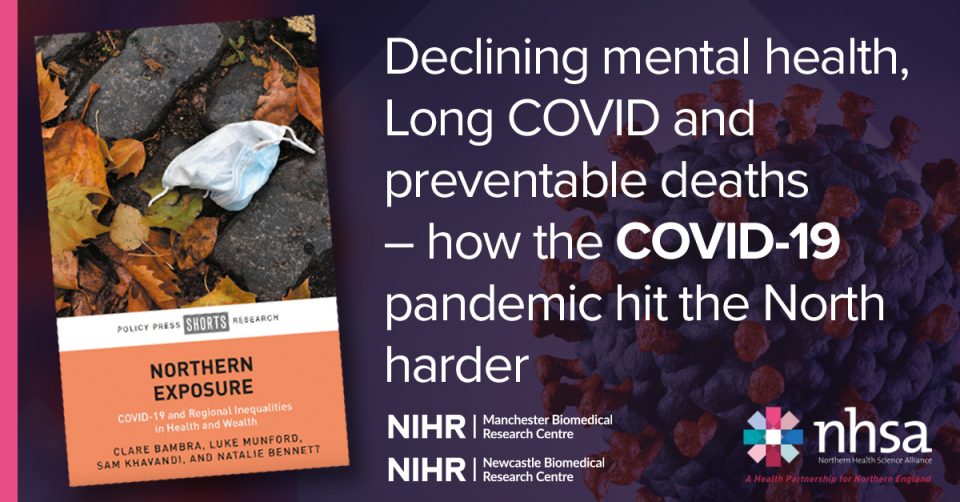
Declining mental health, long COVID and preventable deaths – how the COVID-19 pandemic hit the North harder
A book that details the inequalities people in the North of England faced during the COVID-19 pandemic has been released
13th March 2023
A group of leading academics have today (Monday 13th March) released a book that details how people in the North of England suffered significant inequalities compared to their Southern counterparts during the COVID-19 pandemic.
Northern Exposure, written by Professor Clare Bambra and Dr Natalie Bennett of Newcastle University and Dr Luke Munford and Sam Khavandi of the University of Manchester, builds on reports the authors produced with the Northern Health Science Alliance (NHSA) over the course of the pandemic. These showed the devastating impact of regional inequalities on how severely COVID-19 hit the region.
It reveals how:
- Around 2,500 deaths could have been prevented if ‘Levelling Up’ of the North had occurred pre-pandemic.
- The average COVID-19 mortality rate during the first 13 months of the pandemic was 17% higher in the North – an additional 29.4 more deaths per 100,000 people.
- Rates of long COVID are 30% higher in the North than in the rest of the country.
- Hospital pressure was 10% greater in the North, and experienced larger reductions in elective, inpatient, emergency inpatient and outpatient procedures.
- People from minority ethnic backgrounds, women and younger people experienced greater declines in mental health during the pandemic. People in these groups in the North had worse mental health scores than those in the rest of England
The book also details how, in addition to the severe health impacts, the pandemic also took a toll on economic outcomes. On average, those living in the North experienced:
- A 20% higher rise of levels in unemployment compared to the rest of England
- An additional 6 weeks in the harshest levels of lockdown
- A drop in wages during the pandemic compared to elsewhere in the country
Professor Bambra, lead for Inequalities and Marginalised Communities at the National Institute for Health and Care Research (NIHR) Applied Research Collaboration (ARC) North East and North Cumbria, has been instructed as an independent expert witness to module 1 (which examines the UK’s pandemic preparedness and resilience) of the COVID-19 Independent Public Inquiry, chaired by Baroness Heather Hallett. She will do this alongside Professor Michael Marmot, Institute of Health Equity.
She said: “Emerging from the COVID-19 pandemic and entering further challenging times, our book highlights the urgent need for policies that support the building of a stronger, healthier, and more equal country – for everyone.”
Co-author Luke Munford, deputy lead for Economic Sustainability at NIHR ARC Greater Manchester, said: “Before the COVID-19 pandemic, England was a deeply unequal country. Individual circumstances, including where you live, led to different outcomes in key domains of people’s lives, including their health and wealth. We found that more deprived areas in the North experienced greater COVID-19 mortality than equally deprived areas in the rest of the country. In particular, the effects of deprivation on health are made worse when an area is in a region which already has higher deprivation levels.”
Hannah Davies, health inequalities lead for the NHSA, wrote the foreword for the book. She said: “Understanding where the North of England fits into the rejuvenation of the country is vital. The economic arguments for improving the health of the most deprived communities in the UK are clearly and dramatically shown. The North’s relatively poor physical and mental health meant it suffered under the pandemic for longer and it hit harder. Nowhere has it been illustrated more clearly that health is wealth – and that is a lesson we must take into the future.
“Unless action is taken to rectify this, there is likely to be a long-term health legacy from the COVID-19 crisis – with health inequalities increasing into the future. To avoid a long shadow of COVID-19 hanging over the future of the North, we need to act to reduce the North-South divide.”
Northern Exposure is published by Policy Press, an imprint of Bristol University Press and is available to view at https://library.oapen.org/handle/20.500.12657/61395
Related News Articles
Webinar recording: Shaping the Future of Healthcare
The Northern Health Science Alliance, together with Innovate UK, held a webinar 'Shaping the future of healthcare: How to unlock the funding opportunities and academic expertise that can help drive your business forward'.
Read the articleNHSA Chief Executive responds to Spring Statement
The Northern Health Science Alliance's response to the Spring Budget announcement
Read the article#NorthInnovationWomen 2025 list revealed
We are shining the spotlight on hundreds of innovative women today - on International Women’s Day - as we publish the annual #NorthInnovationWomen list
Read the article